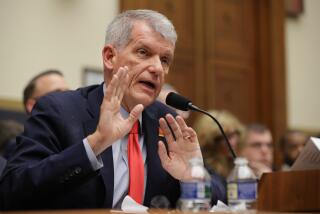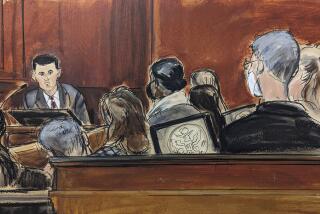Tearful Tales of Investors’ Losses Fill Senate Panel Hearing on Enron
- Share via
WASHINGTON — Retirees and investors who held hundreds of thousands of dollars in Enron Corp. stock tearfully told a Senate committee Tuesday how their life savings were wiped out when the giant energy company plunged into bankruptcy earlier this month.
“I thought I had planned for my financial future and for my children and grandchildren,” said Janice Farmer of Orlando, Fla., who retired from Enron several years ago with $700,000 in her employee stock plan. “Now there is only $4,000 left.”
Seeking answers to Enron’s collapse, members of the Senate Commerce Committee had asked for testimony from the company’s Chairman and Chief Executive Kenneth L. Lay, but Lay chose not to appear in view of inquiries by the Securities and Exchange Commission and the Justice Department.
It was the second time in a week that Lay had refused to testify before a congressional committee. Citing a conflict with a creditors’ committee meeting in New York, he did not appear before the House Financial Services Committee on Dec. 12.
Sen. Byron L. Dorgan (D-N.D.), who chaired the hearing Tuesday, said Lay would appear before the commerce committee early next year.
Dorgan said the largest bankruptcy in U.S. history “raises many serious and troubling issues.”
“This is about an energy company that ... took on substantial risk, created secret off-the-books partnerships and, in effect, cooked the books under the nose of their accountants and investors.”
The company’s Chapter 11 filing Dec. 2 was preceded by accounting problems, leading Enron last month to say it had overstated earnings by $586 million since 1997.
Arthur Andersen, which audited Enron’s books, said one partnership that played a role in the recent restatement of earnings did not get the proper accounting treatment.
Those partnerships, known as special-purpose entities, were set up by Enron to access capital or move debt off the books. Sen. Ernest F. Hollings (D-S.C.), a member of the Commerce Committee, said during the hearing that he might sponsor a bill to eliminate such partnerships.
“It would appear that our audit team was not provided critical information,” C.E. Andrews, Andersen’s global head of auditing, told senators Tuesday about one partnership. “We are trying to determine what happened and why.”
Some senators said the auditors bear a large part of the blame.
Sen. John McCain (R-Ariz.) told Andrews that the accounting firm “has created the appearance of a conflict of interest” by accepting millions of dollars in consulting fees while it also was auditing Enron.
Dorgan, McCain and others suggested that Congress might want to write new legislation to head off Enron-type problems in other companies, including rules that would limit conflicts of interest by auditors and stock analysts and requirements for greater diversification of investments in retirement plans.
It was Enron’s retirees and investors who drew most of the committee’s attention Tuesday.
Mary Bain Pearson, 70, a Houston shareholder, said she had added to her Enron holdings over the years “because I was impressed with what the leaders of the company had to say and because my accountant also believed Enron was a good company.”
Pearson said that, based on newspaper reports, she believed that Lay “was a good man, and I kept my money with his company because I thought he and the people he had placed in positions of trust were honest.
“I didn’t lose a billion dollars,” she said. “But what I did lose was a billion dollars to me.”
Dorgan, holding up a chart showing stock sales by Enron executives since November 2000, remarked that “a substantial amount of stock was sold by officers, directors and insiders at the time they were urging others to buy stock in the company.”
Charles Prestwood, a company retiree, said, “I had all my savings in an employee stock plan, and I lost $1.3 million.”
Prestwood, of Conroe, Texas, said he tried to sell shares when prices began to drop in October but was “locked out” from doing so by a company directive.
More to Read
Inside the business of entertainment
The Wide Shot brings you news, analysis and insights on everything from streaming wars to production — and what it all means for the future.
You may occasionally receive promotional content from the Los Angeles Times.










